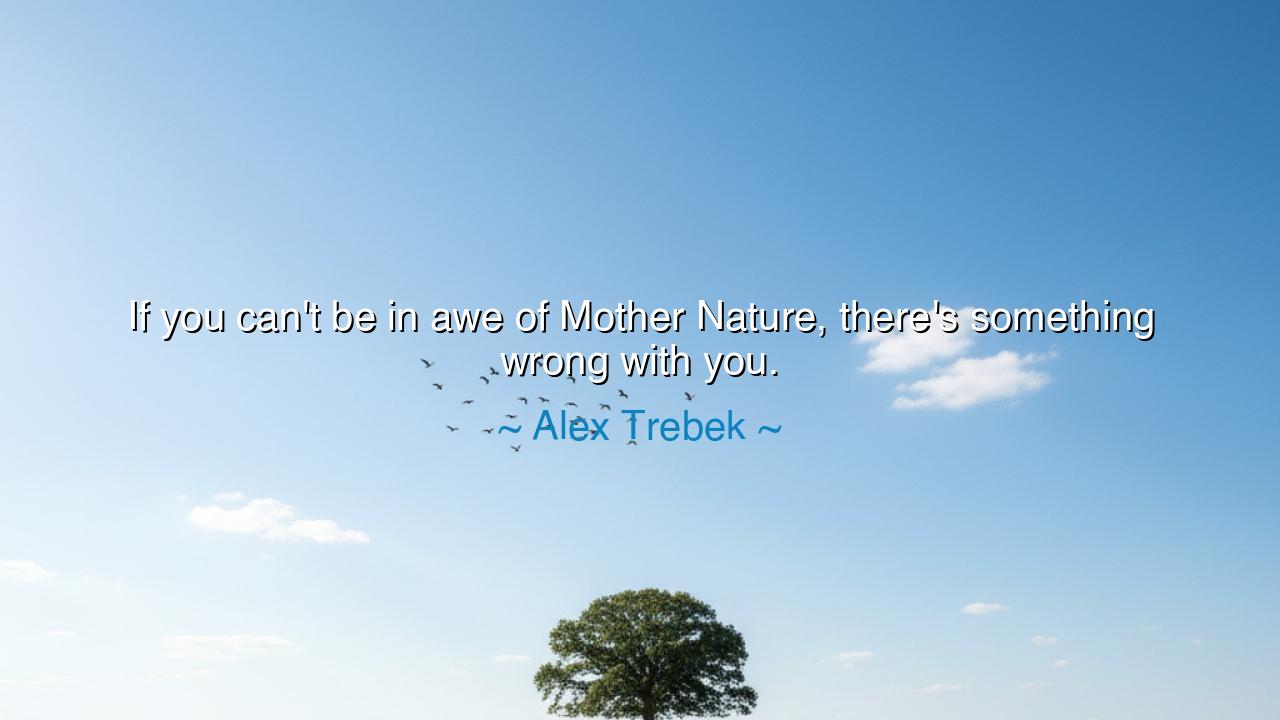
If you can't be in awe of Mother Nature, there's something wrong






When Alex Trebek declared, “If you can’t be in awe of Mother Nature, there’s something wrong with you,” he spoke not only as a man of intellect but as a humble witness to the majesty of creation. Beneath the simplicity of his words lies an ancient reverence — a reminder that to stand in awe of nature is to recognize our place within the grand design of existence. Trebek, whose life was built on the pursuit of knowledge, understood that no matter how far human reason travels, it will always bow before the infinite wisdom of the Earth. His statement is both a confession and a call — a confession of wonder, and a call to remember that our first teacher, our first mother, is the natural world itself.
For the ancients, awe was not a fleeting feeling; it was a sacred response to the divine. The Greeks called it thauma, the wonder that gives birth to philosophy. The sages of the East meditated beneath trees and beside rivers, finding in their stillness the reflection of eternal truth. Mother Nature — the forests, the oceans, the mountains, and the stars — has always been humanity’s first scripture. Before temples were built, men and women worshipped the dawn. Before books were written, the wind and the rain were their teachers. Trebek’s words remind us that to lose awe is to lose our spiritual memory — to forget that we are children of the Earth, not its masters.
In our age of machines and noise, many have become blind to this truth. We hurry beneath the sky without seeing it, consume the fruits of the Earth without gratitude, and poison the rivers that once sustained us. To lose awe is to become numb — to treat miracles as ordinary, to see life without reverence. When Trebek says, “there’s something wrong with you,” he does not mean it with scorn, but with sorrow. For to live without wonder is to live half-dead — alive in body but starved in spirit. Awe is the breath of the soul, and when it fades, humanity loses its compass.
Consider the story of Ansel Adams, the great photographer who devoted his life to capturing the beauty of America’s wild lands. Standing before the peaks of Yosemite, Adams saw not just rock and light, but eternity made visible. His photographs were prayers — silent yet thunderous. Through them, millions who had never seen the wilderness came to feel reverence for it. His work helped inspire the preservation of national parks, protecting nature from the greed of industry. Like Trebek, Adams believed that awe is not a luxury, but a duty. It binds us to the Earth and awakens the moral sense that leads to protection, not destruction.
Throughout history, entire civilizations have flourished when they honored nature — and fallen when they defied her. The Maya, the Romans, the Mesopotamians — each rose from fertile lands and clean waters, yet when they stripped their soil bare and silenced their rivers, they collapsed into dust. The lesson endures: when humanity forgets its awe, it loses its balance. To revere nature is not a sentimental choice; it is the foundation of survival. Those who walk humbly with the Earth walk in harmony; those who try to conquer her will only conquer themselves.
There is also a deeper, personal meaning in Trebek’s words. To be in awe of Mother Nature is to find healing — to remember that life itself is sacred. When you stand before the ocean, or listen to the rain, or feel the pulse of the wind through trees, something ancient stirs within you. It is the recognition that you belong — that your heartbeat is one thread in the great fabric of life. Those who live with this awareness move with gentleness, gratitude, and purpose. They see divinity not in temples, but in every leaf, every wave, every breath.
The teaching is timeless: Awe is the beginning of wisdom. To regain it, one must slow down, look deeply, and listen. Walk barefoot upon the earth. Watch a sunrise without your phone. Plant a tree and tend it as you would a friend. Speak to the rivers not as resources, but as living spirits. Through these small acts, the heart will remember what the mind has forgotten — that the world is not a possession, but a miracle.
So let Trebek’s words echo in your soul: if you cannot feel awe before the grandeur of Mother Nature, it is not the Earth that has grown silent — it is you. Awaken, then. Step outside the walls of indifference and behold the sacred world around you. For to stand in awe of nature is to stand in awe of life itself — and to honor that awe is to live as a true human being, humble, grateful, and profoundly alive.






AAdministratorAdministrator
Welcome, honored guests. Please leave a comment, we will respond soon